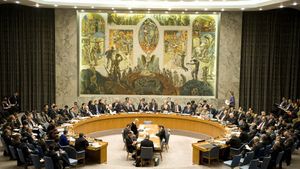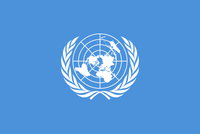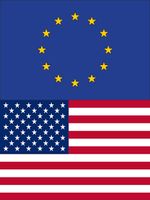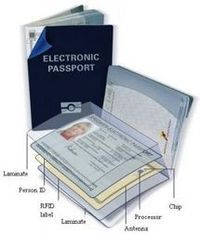Combating terrorism and rebuilding transatlantic relations
| Faculté | Faculté des sciences de la société |
|---|---|
| Département | Département de science politique et relations internationales |
| Professeur(s) | Rémi Baudoui[1] (2011 - ) |
| Enregistrement | 2014, 2015 |
| Cours | Terrorism and international relations |
Lectures
- Terrorism or terrorisms? Some epistemological considerations
- National security and counter-terrorism: the example of Latin America
- Internationalisation of struggles and emergence of international terrorism
- International relations and the fight against international terrorism
- The United States and the New International Order
- Middle East Geopolitics
- September 11, 2001 ruptures
- Al-Qaida and the "geopolitics of radical terrorism"
- Combating terrorism and rebuilding transatlantic relations
- Arab Spring Against Terrorism: Issues and Perspectives
- Homegrown jihadism: How to prevent terrorist catastrophe?
The UN: the Security Council[modifier | modifier le wikicode]
Hyperterrorism is causing intense UN activity. Through its peacekeeping missions, the Security Council is immediately seized. In the tradition of the United Nations, the Security Council ensures the collective security of peace against the war of nation-states. It can also intervene militarily in the name of peace violations.
September 11 will reactivate security issues on the UN side. It is logical that the first body to be seized should be the UN Security Council, which is in charge of collective security, peace and war between nation-states, especially since George Bush had called these events "war". There is an arrest of the United States in the Security Council leading to the resolution of 12 September:"Condemns categorically in the strongest terms the appalling terrorist attacks... and considers such acts, as any international terrorist act, as a threat to peace and international security".
The Security Council endorses George Bush's speech. The Security Council is breaking the dogma of its dedicated missions on war that makes no distinction between acts of terrorism and acts of war. Terrorism is equated with war, which makes no distinction between "harm to peace" through war and "harm to the security" of one or more States. Since there is an attack on world peace, it is only logical that the States concerned should be able to use military force to stop terrorism. From now on, September 11 terrorism is a military act, and the Security Council authorises the use of coercive military forces against terrorism. This formula will be used again during the Bali bombings in 2002 and the attack of a theatre in Moscow by Chechens. According to Moscow, the Chechen affair is a Russian affair since Chechens are considered as Russian. Contradictions quickly appear on September 12.
Self-defence[modifier | modifier le wikicode]
The Security Council was established to regulate conflicts based on public international law on the basis that the resolution of international conflicts is based on regulation seeking peace. It's UN diplomacy. By tradition, the Security Council has fought the idea of self-defence in international law and world governance. After 09/11 and the resolution of 12 September 2001, the principle of self-defence is recognized and accepted, recognizing the inherent right of individual or collective self-defence in accordance with the Charter of the United Nations. The paradox is that the Security Council is designed to build peace by committing states to act against terrorism at a time when the United States is engaging in war against the Taliban.
There is a shift towards the concept of pre-emptive war with the agreement of the United Nations. A new paradox emerges: how to apply the concept of self-defence to States. The difficulty of justification is to the extent that the concept of self-defence can only be engaged in armed aggression. The concept of armed aggression refers to the use of one State's military forces against another State. A State can help terrorism, but cannot be considered a terrorist movement.
The question is how to overcome this contradiction. How can we overcome the second contradiction between an aggression that is not a military act and a military response? The technical solution to be sought is to consider the nature of the object. It will find meaning in a technical reflection on the terrorist act: a civil aircraft is not a military weapon. So the weapon is not by nature an object. The weapon can become a weapon by destination. The civilian plane turned into a bomb is therefore a military weapon.
Once the Security Council has recognised the concept of self-defence and accepted it opens up other contradictions. The Security Council has not formally authorized the United States to act, but on the contrary, the United States is acting without seeking the approval of the Security Council. It is therefore difficult for the Security Council to pronounce itself on the merits of the American intervention. The risk incurred by the Security Council is therefore that of encouraging States to act by their own authorities without referring to the UN and the Security Council itself. The paradox is that the Security Council, through this position paper, encourages States to speak out for their own authority without reference to the United Nations and the Security Council.
The International Legislator[modifier | modifier le wikicode]
Il va y avoir une production de textes importants. Après le 11 septembre, le Conseil de Sécurité est devenu une sorte de législateur international. La résolution 1373[2] prise le 28 septembre 2001 établit de nouvelles règles de prévention contre le terrorisme avec des mesures nouvelles :
- contrôle et lutte contre le financement du terrorisme : pour arrêter le terrorisme, il faut contrôler les logiques de financement qui sont derrières ;
- lutte contre les appuis passifs et actifs ;
- définition du terrorisme comme des crimes graves punissables.
Resolution 1377 of 12 November 2001 stipulates that all States members of the United Nations in accordance with the Charter of the United Nations must combat the scourge of terrorism.[3].
Principle of Deterritorialisation[modifier | modifier le wikicode]
Resolution 1390 of 16 February 2002 :
« Decides that all States shall take the following measures with regard to Usama bin Laden, members of Al-Qaida and the Taliban and other individuals, groups, undertakings and associated entities included in the list established pursuant to resolutions 1267 (1999) and 1333 (2000), to be updated periodically by the Committee established pursuant to paragraph 6 of resolution 1267 (1999), hereinafter referred to as "the Committee":
Recalls the obligation of all Member States to fully implement resolution 1373 (2001), including with regard to any member of the Taliban or Al-Qaida organization and persons, groups, undertakings and entities associated with the Taliban or Al-Qaida organization who participate in the financing of terrorist acts, organize, facilitate, prepare, execute or support them; »
There is a renewed perception that this new terrorism is effective because it has real logistics. The Security Council demands the fight against a global network based on the constitution of a global response justifying a principle of deterritorialization of counterterrorism action. It is modern states that have built the security paradigm to protect themselves and themselves from this type of threat, and counterterrorism action is constrained by the fact that each state can act within its own borders. This raises the problem of efficiency, as everyone manages only at home. The difficulties are that to say "what is international law" makes sense, but "who applies it" is here without a clear answer.
New legislation in the United States[modifier | modifier le wikicode]
Patriot Act[modifier | modifier le wikicode]
After 9/11, the United States is taking new counter-terrorism measures. Once they have built up their counter-terrorism measures, they will turn against the Europeans. The counterterrorism mechanism is very restrictive because it comes from a hegemonic power that says the conditions of passage to others. All the major questions that will arise around the loss of civil and public liberties in Europe are rooted in the very conditions in which the struggle is built.
On October 26,2001, the USA Patriot Act was passed, giving new powers to police and intelligence agencies. The authorities may arrest and detain foreigners suspected of being in contact with terrorist groups for an indefinite period of time. The fact that we are outside a traditional device appears. Is set up a surveillance of the Net with a "carnivorous" system of the FBI which is a control of all information systems. The USA Patriot Act will offer extraordinary investigative capabilities. It states that crimes are considered terrorists if they are "committed knowingly for the purpose of influencing or affecting the government by intimidation or coercion... or in retaliation for operations conducted by the government".
Strengthening the Executive[modifier | modifier le wikicode]
The Executive Order of 13 November 2001 sets up exceptional military tribunals to try foreigners suspected of participating in or supporting terrorism with no possibility of appeal, secret and unlimited detention, without having the right to a lawyer. More than 1,200 people are arrested solely on the basis of their Arab, Muslim or South Asian origins. Between 1999 and 2000, the Anti-Terrorism Task which is the Counter-Terrorism Force summoned and interrogated 5,000 foreigners on the basis of their nationality. Contrary to international conventions, foreigners are sent back to their countries despite the risks involved.
Electronic Surveillance and Cyber-Terrorism[modifier | modifier le wikicode]
The notions of cyberwar and cyber-terrorism are becoming central to the internal security of the United States. Homeland Security Secretary Tom Ridge says his department will "monitor the Internet for signs of terrorist attacks, cyber-terrorism, piracy and information warfare between states. This is accentuated with filtering methods based on logarithmic logics.
No distinction is made between "virtual" and "physical". With the Cyber Security Enhancement Act, which requires access providers to collaborate. Total Information Awareness makes it possible to cross-reference databases in order to combat terrorism. The Department of Justice grants itself the right to prosecute hackers, regardless of their nationality and the location of the crime.
Guantanamo[modifier | modifier le wikicode]
Guantanamo is the manufacture of a lawless zone. It is an American naval base leased to the Cuban government, which escapes judicial control of the American courts. Guantanamo has no legal existence because it is on Cuban territory. Prisoners do not have a legal existence disappearing in a non-legal right without trial, charge, lawyer and court and above all without status. As this is not a war, prisoners cannot be called "prisoners of war". A place without a legal existence is invented where prisoners cannot contest their incarceration and do not enjoy the status of prisoners of war, which allows them to assert the rights guaranteed by the[The substantive rules of the law of armed conflict# The Geneva Convention III: the protection of prisoners of war[3rd Geneva Convention]]. As there is no process and legal existence, prisoners can be detained indefinitely.
The executive branch of government thus confers extraordinary powers on itself in opposition to international law.
Patriot Act II[modifier | modifier le wikicode]
The Patriot Act II was established in 2003 as a continuation of the Patriot Act I, which strengthened the powers of the executive to the detriment of the judiciary and strengthened the establishment of a state of emergency. New developments include facilitating the expulsion of non-citizens, extending the application of the death penalty, new means to the police and intelligence services such as telephone and computer tapping.
It also makes it possible to apply measures hitherto reserved for foreigners to American citizens, such as the withdrawal of American citizenship. Withdrawal of citizenship means introducing a person into lawlessness by creating individuals who no longer have a legal existence on the planet.
Europe: Towards a European anti-terrorist security[modifier | modifier le wikicode]
Transatlantic cooperation after 11/09[modifier | modifier le wikicode]
There is a strengthening of the security system in the United States, which will be transferred to Europe through the transfer of passenger data, port and cargo security and the biometric passport. The question is whether this is cooperation or cooperative power relations?
On 21 September 2004, flight 919 United Airlines London - Washington was hijacked by US security and forced to land in Maine. The singer Cat Stevens converted to Islam under the name of Yusuf Islam is interrogated and sent back to Great Britain.
The principle of the Passenger name record[PNR] is the collection and processing of airline passenger data before boarding by US security with the transatlantic cooperation between the United States and the European Union. This involves exchanging computer files on passenger transfers. This system is being put in place by the American authorities despite the European Union's reluctance to take action because of public freedom issues. Security cooperation between the United States and the European Union on the three issues mentioned above takes place in a context of tensions and power relations. This is the "if you do not comply, no more French and/or European planes will be able to land on American runways".
The American authorities demand European security aid. Europe is reluctantly accepting in an area where its security is still weak and uncoordinated. European negotiators have often been taken aback or overwhelmed by the reality of the stakes and coordination. The American authorities are requisitioning European aid. Europeans have accepted restrictive conditions of freedom for US security issues.
In the tradition of modern democracy, what underpins security is freedom. If individuals are free and equal, it is a prerequisite for the security of individuals, i. e. the ability to think about their security. The conceptual reversal is to say that security is the foundation of freedom. Basically, freedom can only come from security. It is an exclusionary principle that is a worrying factor for the future of our democracies.
Passengers Data Transfer[modifier | modifier le wikicode]
In November 2001, the US Congress passed the Transportation Security Act[TSA]. Customs authorities obtain access to data collected by airlines bound for the United States or transiting on its territory with the possibility of cross-checking passenger lists with FBI and CIA and open data ranging from age, identity and food preferences. The objective is to pre-filter passengers using the Computer Assisted Passenger Prescreening System[-CAPPS II] to assess the risk of terrorist behaviour.
European airlines have been ordered to accept the transfer of data under penalty of heavy fines and non-authorisation to land or even ban the company. The companies are under an obligation to accept and thus infringe Community legislation. The European Union is obliged to accept and negotiate an interim agreement before entering into a final agreement.
Port and Cargo Security[modifier | modifier le wikicode]
The hypothesis is that there are 16 million containers per year circulating in the United States. In the globalization there is a massive container transfer system. The question is what would happen if the terrorists used a weapon of mass destruction placed in a container for the United States.
The Container Security Initiative[CSI] is implemented. All containers destined for the United States must be inspected prior to arrival in the United States. This poses control problems, which is why the containers must be checked at the start, but not at the end. The control of containers is carried out on European territory, but by American customs officers. In the CSI list, a list of ports is included in order to avoid congested inspections on US territory. The purpose of the procedure is to identify, inspect and, if necessary, separate or prohibit risk containers. Container descriptions must be sent to US Customs 24 hours before departure.
Initially, bilateral negotiations were initiated between the United States and each European country and an agreement was signed in December 2003 with the European Union providing for the presence of American customs inspectors in European ports and the transmission of information 24 hours before the departure of containers. An operational agreement has been in place since 2004 for the ports of Rotterdam, Le Havre, Antwerp, Gothenburg, La Spezia, Genoa, Felixstone, Hamburg, Bremerhaven and also Algeciras.
The biometric passport[modifier | modifier le wikicode]
In May 2002, Congress passed the Enhanced Border Security and Visa Entry Reform Act. The initiative started in the United States and the Europeans will adopt it later, but in a consensual way. These are measures to improve border control by restructuring the agencies concerned and further developing new border surveillance technologies. It is also an obligation contained in the Patriot Act I that citizens of 27 countries, most of them European, travel to the United States with a secure passport containing biometric data. The US-Visit program has been in place since September 30,2004, which provides that every visitor to the United States is given a digital photo and fingerprint scan.
The European Union's commitments are fully in line with US efforts. After 11 September, Europeans are considering the introduction of biometrics in passports. On 13 December 2004, the Council of Foreign Ministers adopted a regulation making it compulsory within 18 months to implement passports containing storage media with facial photographs.
With regard to the fight against terrorism, it appears that, in a way, the attacks of 11 September have an impact almost on a global scale, but with the concept of security in the United States as a starting point. There is a concept of broader security whose fundamental purpose is to maintain the efficiency of the economic system. Safety is important, but it must not interfere with the operation of the device. The aim is to enable the economic system to operate, but which offers remote and sectoral controls that share costs and contribute to a common safety culture. There is no reason why cooperation between the United States and the European Union should be reduced.
Internal security in the European Union[modifier | modifier le wikicode]
Once the model of counterterrorism has been based on shifting the question of the struggle with the protection of the nation-state within the national territory, but also outside it, in the doctrine of security, there is a gradual transition from within to outside.
In Al Qaida terrorism, there is the integration of global dimensions. Some of the actors of 11 September had visited Europe. In order to better prevent risks, relocate the premises of security, the concept of extended security being able to save time compared to the perception of the threat in the United States, but also to avoid the economic paralysis on site in the United States by deploying a security that would slow down the activity of trade and imports. Remote control' is also offered as a cost-sharing arrangement between the major powers offering the conditions for solidarity between the United States and the European Union in the security market. Cooperation between the United States and the European Union is therefore bound to continue and intensify in the fight against terrorism.
The example of US-EU cooperation: the case of Afghanistan[modifier | modifier le wikicode]
« Terrorism is a real challenge for the world and for Europe. The European Council has decided that the fight against terrorism will be more than ever a priority objective of the European Union »
— . European Council of 21 September 2001.
Today, therefore, European security aims to achieve interstate security within the framework of the European Union, a solidarist security between States that is intended to be unified by linking internal and external security. The European security doctrine therefore aims to "inside" its borders, but from the point of view of "outside" management. As in the case of the United States, internal security and external security go hand in hand for the European Union.
« The fight against terrorism will continue to be a priority objective of the European Union and one of the main strands of its foreign policy. International solidarity and cooperation are essential instruments to combat this scourge. »
— European Council of june 2002.
United States-led armed coalition formed to fight Taliban in Afghanistan[modifier | modifier le wikicode]
As part of the cooperation between the United States and the European Union, European states agree to send troops to Afghanistan under the NATO banner. NATO integrates the fight against terrorism.
On the European side, the European Security and Defence Policy (ESDP) is being implemented with the aim of strengthening European military capabilities. The problem with ESDP is that it depends on NATO, which highlights a contradiction between the European will to create a defence body and the US method embodied in NATO. There are conflicts of management, but what is at stake is the definition of collective tools that make it possible to articulate internal and external defence. For the time being, ESDP is dependent on NATO in Afghanistan.
Annexes[modifier | modifier le wikicode]
Bibliography[modifier | modifier le wikicode]
- Alexandre Adam, La lutte contre le terrorisme, Etude comparative, Union européenne-Etats-Unis, Paris, L’Harmattan, 2005 ;
- Giorgio Agamben, Etat d’exception, Paris, Le Seuil, 2003 ;
- (Sous la direction de Karine Bannelier, Olivier Corten, théodore Christakis, Barbara Delcourt), Le droit international face au terrorisme, Paris, Editions Pedone, 2002 ;
- Duncan Campbell, Surveillance électronique planétaire, Paris, Allia, 2003 ;
- Général Etienne Copet, Prévenir le pire. Eviter les catastrophes terroristes, Paris, Michalon, 2003 ;
- Michel Delebarre, Quelle coopération internationale pour lutter contre le terrorisme ?,rapport de la commission des Affaires étrangères de l’Assemblée Nationale, rapport 176, juillet 2004 ;
- (sous la direction de Michel Fortmann, Alex Macleod et Stéphane Roussel), Vers des périmètres de sécurité ? La gestion des espaces continentaux en Amérique du Nord et en Europe, Québec, Athéna, 2003 ;
- (Sous la direction de Alex Macleod), Lutte antiterroriste et relations transtlantiques, Bruxelles, Bruylant, 2006 ;
- (sous la direction de Arthur Paecht, Les relations transatlantiques. De la tourmente à l’apaisement ?, Paris, PUF, 2003 ;
- Olivier Hassid, La société vulnérable. Criminalité, terrorisme et insécurité en Europe, Paris, Le Félin, 2006 ;
- La lutte contre le terrorisme, les normes du Conseil de l’Europe, Conseil de l’Europe, février 2004. ;
- Les Cahiers de la Sécurité intérieure, Reconstruire la sécurité après le 11 septembre, INHES, décembre 2004 ;
- Wenceslas de Lobkowicz, L ‘Europe de la sécurité intérieure, Paris, La Documentation française, Paris, 2002 ;
- Jean-Claude Paye, La fin de l’Etat de droit. La lutte antiterroriste de l’état d’exception à la dictature, Paris, 2004, La Dispute ;
- Fernando Reinares (sous la direction de), European Democracies against Terrorism, Governmental policies and intergovernmental cooperation, Abington, Ashgate Publishing, 2001 ;
- "Comment L'obsession Sécuritaire Fait Muter La démocratie." Comment L'obsession Sécuritaire Fait Muter La Démocratie, Par Giorgio Agamben (Le Monde Diplomatique, Janvier 2014). N.p., n.d. Web. 15 Sept. 2014. <http://www.monde-diplomatique.fr/2014/01/AGAMBEN/49997>.
References[modifier | modifier le wikicode]
- ↑ Page personnelle de Rémi Baudoui sur le site de l'Université de Genève
- ↑ "Security Council Resolution 1373 (2001) Threats to International Peace and Security Caused by Terrorist Acts." SECURITY COUNCIL RESOLUTIONS - 2001. UN, n.d. Web. <http://daccess-ods.un.org/TMP/3771191.23935699.html.
- ↑ "Security Council Resolution 1377 (2001) Threats to International Peace and Security Caused by Terrorist Acts." SECURITY COUNCIL RESOLUTIONS - 2001. UN, n.d. Web. <http%3A%2F%2Fdaccess-dds-ny.un.org%2Fdoc%2FUNDOC%2FGEN%2FN01%2F633%2F01%2FPDF%2FN0163301.pdf%3FOpenElement>.







